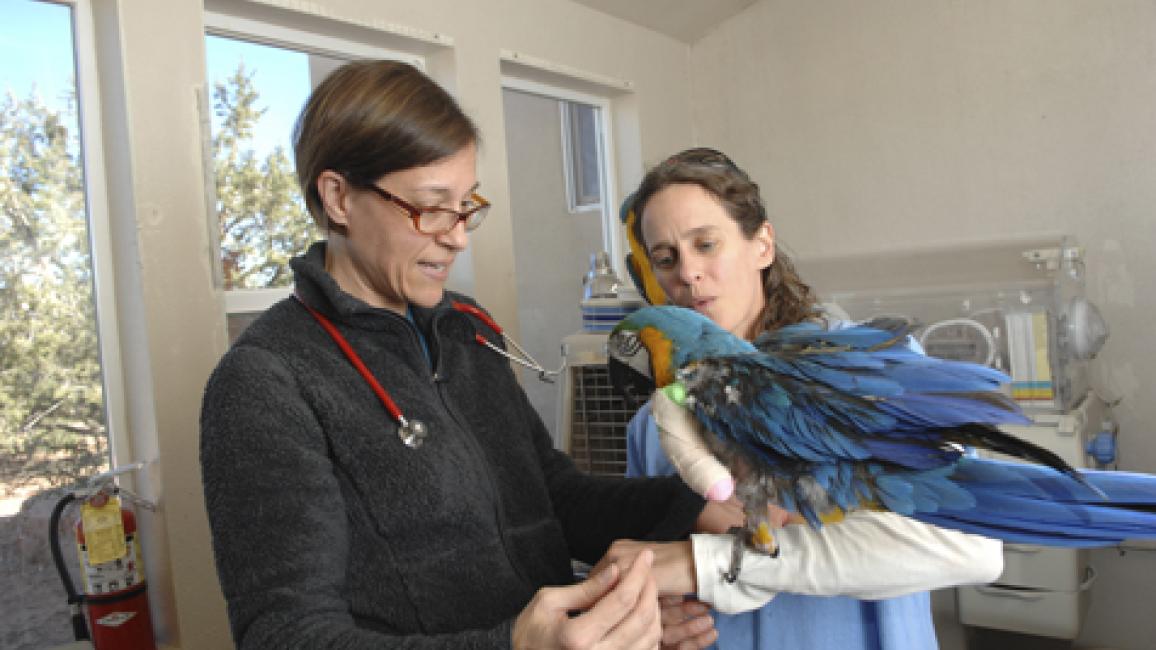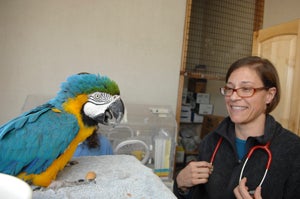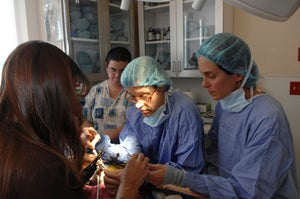Avian veterinarian volunteers her time to help parrots

Lots of people love getting together with old friends even after they move far apart. Not nearly as many folks, however, then spend a long day saving lives in the surgery room as part of the get-together! For Best Friends veterinarian Dr. Patti Iampietro, one such friend came to town recently with just such an agenda.
Dr. Margaret Fordham flew in from Pennsylvania to spend five days in town, volunteering her time and expertise for the animals at Best Friends. Dr. Margaret and Dr. Patti met in 1995, when they worked as colleagues doing emergency and critical care medicine for a referral veterinary hospital near Philadelphia. They worked together for 10 years, becoming close friends. "We shared a lot of laughs and helped each other through tough cases," Dr. Patti explains.

Dr. Margaret at the Sanctuary
Parrots needing a veterinary avian specialist's care
Dr. Margaret has a strong interested in special species medicine. "I would make her see all the birds," Dr. Patti says with a smile about their time together as colleagues. Which is why Dr. Patti knew exactly whom to ask for help when several parrots at Best Friends needed a specialist’s care.
To be clear, Dr. Patti, while not an avian specialist, has been learning more and more about how to treat parrots over the years at Best Friends. In fact, the employees over at the Parrot Garden (the parrot part of the Sanctuary) love her for her efforts! "Dr. Patti has been an absolute rock star in taking on these birds," says parrot caregiver Wendy Hatchel. Even so, Dr. Patti knew when she needed expert assistance, and this was one of those times. She asked Dr. Margaret if she’d be willing to come out and donate her time to the animals at Best Friends. Dr. Margaret was happy to do so.
Parrots with various medical challenges
The parrots all presented different challenges. First, there was Boo, a ruby macaw with an old wing injury that hadn’t been treated before she came to Best Friends. As a result, she was unable to extend her wing. This injury still caused her pain, and made her lose balance and fall when she’d try to extend her wing. Boo had come a long way in other areas — she’d been quite sick when she first came to Best Friends — but this one particular problem, her wing, required surgery.

Parrots getting expert medical treatment
Then there was Sunshine, a blue and gold macaw who had been so sick upon arriving at the Sanctuary not long ago that a vet in Las Vegas had suggested euthanasia. When she came to Best Friends, she was underweight, battling a serious infection, and hadn’t eaten in several days. Critical, round-the-clock care (she lived in an incubator at parrot caregiver Wendy’s house) helped Sunshine get back on her feet and out of the danger zone. "Within a week, most people didn’t even realize it was the same bird," Wendy points out. Yet in the end, she required surgery to ensure her long-term health.
Bonnie, a greenwing macaw visiting from another parrot rescue until she gets back on her feet, had necrotic buildup in her throat. She needed to have her throat cleaned out, as well as tissue samples taken and blood drawn, all of which were done on the surgery table.
Lastly, Olive, an orange-capped conure, had sustained an injury from another bird that left her beak cracked all the way to the jaw bone. A bird beak is a lot like human fingernails — it continually grows and wears down. In Olive’s case, however, her beak needed to fuse back together with a little help from surgery.
All four surgeries took place in one day. "It was amazing working with Margaret," Dr. Patti says. "She has so much experience and knowledge about birds that I was able to learn a great deal and improve my own knowledge and comfort level working with birds. I simply could not have done those surgeries without her present."
Vet care for parrots takes considerable training. Some vets won’t examine parrots at all. One really tricky area in parrot veterinary care, for example, involves anesthesia. "Birds are extremely sensitive to anesthesia," Dr. Patti explains. "Ensuring they do well under anesthesia is equally as demanding if not more so than the surgery itself." With Dr. Margaret running the anesthesia and helping with the surgery, Dr. Patti learned a ton along the way. All four birds came through successfully.
And how did Dr. Margaret enjoy her stay? "She loved it!" Dr. Patti says. "She had fun and really enjoyed sharing her expertise."
Veterinarians who volunteer
Veterinarians everywhere (specialists, in particular!) can do a lot of good in the animal rescue world by donating their time and talents, as did Dr. Margaret. "The help of specialists is always in need and very much appreciated," Dr. Patti says. "I feel that veterinarians who donate their time and knowledge to animal rescue or shelters receive so much in return, a feeling you can get in no other way than helping those animals that have no one else."
Parrots doing very well
The four parrots who benefited from Dr. Margaret’s generosity are all doing well, as are the many other animals for whom she spent time giving tips and suggestions to the medical staff and caregivers at Best Friends. That’s another great thing about vets donating their time to animal rescues. The knowledge they leave behind can far outweigh the effects of the actual hours they spend volunteering.
"There is only so much you can learn from a book," Dr. Patti points out.
Sponsor a parrot at Best Friends
Adopting a parrot is a lifetime commitment since many of them can live a human lifespan. For people who can’t commit to adopting a feathered friend, why not make a donation to help birds in need instead?
Photographs by Gary Kapalkoff